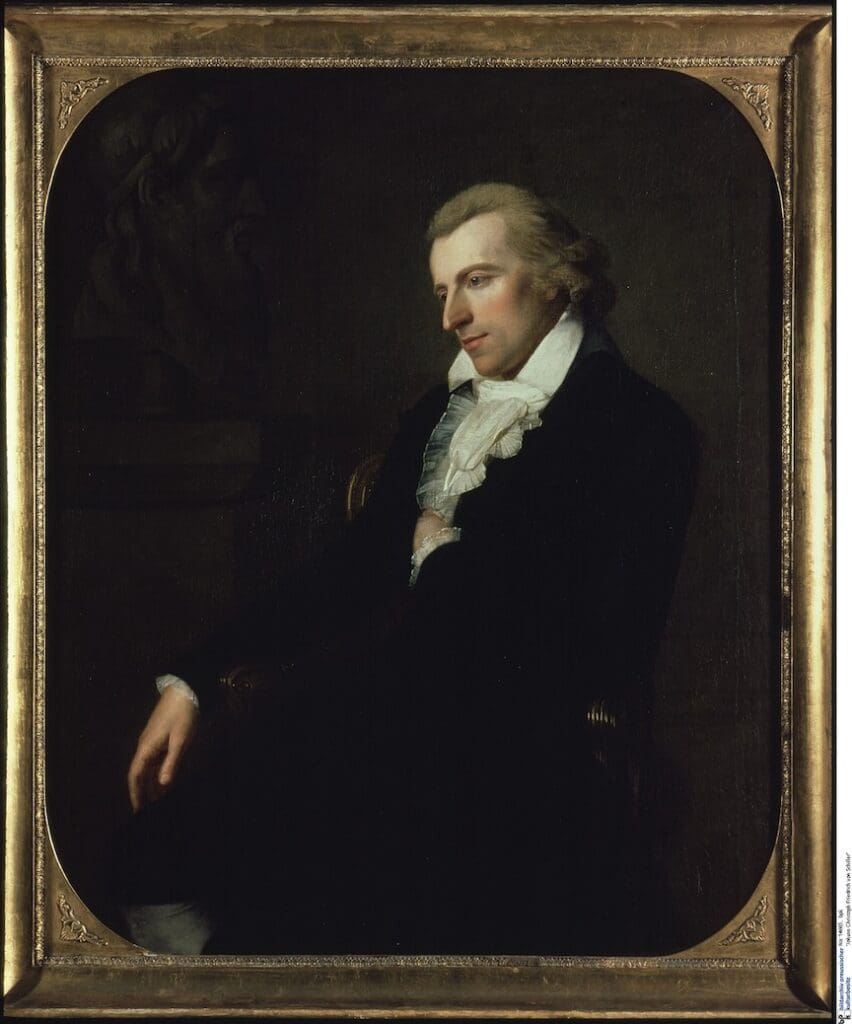According to Friedrich Schiller (1759-1805), sensuous man must pass through aesthetic experience, which is physical, in order to reach the conditions of reason and morality.
Let us begin by noting that Schiller was not a huckster for democracy. Though he can be mysterious, at least to me, and sometimes cloyingly abstract, he nevertheless imagines that what makes a man is not that he exists as a cipher for the purpose of counting. Schiller does not, for instance, discount reason and faith. If the more numerous faction declares that something is “right,” he is unimpressed. What was wrong is still wrong.
Like the Founding Fathers of America, he is, in fact, suspicious of democracy. Right and wrong are discernible in nature. The republic that God smiles upon will be favorable to the right, and will advance righteous interests. It will not be indifferent to the making of good men. It will be naturally opposed to men who are evil. It will be at the service of men who are free.
Being free, therefore, does not mean simply having the vote. It rather means not having a vote for the purpose of creating our rational and moral realities. It means rather leaving to God – or to “The Absolute” – what is in God’s realm.
And this means we must become, as it were, art students, to discover what is true. We must, by an effort that is not indifferent, allow ourselves to be restored to the condition of being truly human; to being Man among Men.
Schiller, of course, wrote about this in an aspirational way. The habit of participating in his poetry of “joy” has continued over the intervening centuries, with Beethoven’s help.
Though he became a professor of philosophy (and history) at Jena, he was never a professional philosopher in the contemporary meaning; he does not use words with mechanical precision. He was one of the great amateur philosophers, like Plato, Aristotle, Saint Thomas, and the rest.
His interest was in the truth, and in finding a way to live it (in the moments when he was not being a degenerate himself). Mostly, he wished to escape being what Fichte would call a “pure Object,” pushed about by material causes. Instead, he wished to be pushed about by the Absolute, Schiller’s eccentric name for God the Father.
And it was in his quest for an education that would make men human – in the highest sense – that he, I think inevitably, fell back upon the idea of “education through art.” This had been expounded by Plato in The Republic (books III and VII), in The Laws, and in Protagoras.
Schiller’s contribution was “On the Aesthetic Education of Man,” a series of 27 letters. The best modern “textbook” is by Sir Herbert Read: Education Through Art.

It is curious, to my mind, that all the other educational theories largely ignore this dimension, in favor of things that I consider to be irrelevant.
They like to teach art, in a technical, “how to” sort of way, but as most artists of all the various arts realize, the subject cannot be taught. Indeed, most topics, including engineering and veterinary medicine, cannot be taught. One learns what can be learnt, not from bureaucrats, but by example.
This rolls in the train of freedom and of godliness. A man (or woman, as we now say) discovers things by throwing himself in; by “going with God,” as my father (a sometime teacher) used to put it. And by “mimesis,” as the Greeks understood this term.
One learns in the course of breathing, and one is educated by what one becomes – educated, well or poorly. As an inspiring university professor once told me, when I asked if his best handful of students had anything in common: “All, without exception, were self-educated.”
Only the deadbeats had to be “taught,” and none of the many hundreds gained much by it.
Reason and faith, which are background to morality, are communicated in one’s encounter with truth. This begins with first strange perceptions, and by means of that holy humility that is one’s guide beyond the reach of schools. Art forms the person, his knowledge and his manner, as he becomes an artist – or a wastrel.
To be fair to schools, they were useful when teachers and staff understood their unambiguously moral function. This was the case before the idea of “freedom” came to exclude any notion of responsibility.
For the replacement idea can only be that a person is (like an animal) a consumer of things. He learns to consume, and what he does is a process of assimilation.
Voila! The secret of “production,” which is now praised; the secret by which the various forms of nutrient are transformed into bowel movements. More efficient production makes a larger quantity, but really it is not an art, except for small children. On the other hand, production targets are quintessentially modern.
But it is by his intentional solidarity with beauty, that one matures into a creature who is human, above the animal level of pure sensory experience. One is born with the instinct to “put things right.”
Man alone, of all the world’s creatures, has this instinct in an unambiguously intellectual form. Likewise, he searches for the right position for himself, within the whole order of society. He does not seek equality, which is never available; he looks for a role as the capacities of his being are revealed to him.
It is for this reason that education through art leads to aristocracy. For the world is large, and has space for the extraordinary variety of human beings, “expressing themselves” while they work together.
Unfortunately, there is little room for freedom in our present economic and educational arrangements. We are slaves as animals are slaves, to the nature into which they were born.
We were created by God to flourish as artists, but lo, we are creating more and more waste.










